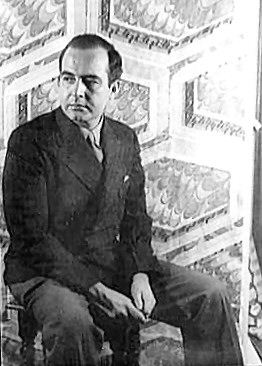Related Research Articles

Elizabeth Barrett Browning was an English poet of the Victorian era, popular in Britain and the United States during her lifetime and frequently anthologised after her death. Her work received renewed attention following the feminist scholarship of the 1970s and 1980s, and greater recognition of women writers in English.

Robert Browning was an English poet and playwright whose dramatic monologues put him high among the Victorian poets. He was noted for irony, characterization, dark humour, social commentary, historical settings and challenging vocabulary and syntax.

Samuel Osmond Barber II was an American composer, pianist, conductor, baritone, and music educator, and one of the most celebrated composers of the mid-20th century. Principally influenced by nine years' composition studies with Rosario Scalero at the Curtis Institute and more than 25 years' study with his uncle, the composer Sidney Homer, Barber's music usually eschewed the experimental trends of musical modernism in favor of traditional 19th-century harmonic language and formal structure embracing lyricism and emotional expression. However, he adopted elements of modernism after 1940 in some of his compositions, such as an increased use of dissonance and chromaticism in the Cello Concerto (1945) and Medea's Dance of Vengeance (1955); and the use of tonal ambiguity and a narrow use of serialism in his Piano Sonata (1949), Prayers of Kierkegaard (1954), and Nocturne (1959).

An elegy is a poem of serious reflection, and in English literature usually a lament for the dead. However, according to The Oxford Handbook of the Elegy, "for all of its pervasiveness ... the 'elegy' remains remarkably ill defined: sometimes used as a catch-all to denominate texts of a somber or pessimistic tone, sometimes as a marker for textual monumentalizing, and sometimes strictly as a sign of a lament for the dead".
This article contains information about the literary events and publications of 1980.

Samuel Daniel (1562–1619) was an English poet, playwright and historian in the late-Elizabethan and early-Jacobean eras. He was an innovator in a wide range of literary genres. His best-known works are the sonnet cycle Delia, the epic poem The Civil Wars Between the Houses of Lancaster and York, the dialogue in verse Musophilus, and the essay on English poetry A Defence of Rhyme. He was considered one of the preeminent authors of his time and his works had a significant influence on contemporary writers, including William Shakespeare. Daniel's writings continued to influence authors for centuries after his death, especially the Romantic poets Samuel Taylor Coleridge and William Wordsworth. C. S. Lewis called Daniel "the most interesting man of letters" whom the sixteenth century produced in England.
This article contains information about the literary events and publications of 1800.

John Crowe Ransom was an American educator, scholar, literary critic, poet, essayist and editor. He is considered to be a founder of the New Criticism school of literary criticism. As a faculty member at Kenyon College, he was the first editor of the widely regarded Kenyon Review. Highly respected as a teacher and mentor to a generation of accomplished students, he also was a prize-winning poet and essayist. He was nominated for the 1973 Nobel Prize in Literature.

Pauline Kael was an American film critic who wrote for The New Yorker from 1968 to 1991. Known for her "witty, biting, highly opinionated and sharply focused" reviews, Kael's opinions often ran contrary to those of her contemporaries.
Michael Roberts, originally named William Edward Roberts, was an English poet, writer, scientist, mathematician, critic and broadcaster, a polymath who made his living as a teacher.
Phyllis Webb was a Canadian poet and broadcaster.
Nationality words link to articles with information on the nation's poetry or literature.
Nationality words link to articles with information on the nation's poetry or literature.
Nationality words link to articles with information on the nation's poetry or literature.
Nationality words link to articles with information on the nation's poetry or literature.

John Koethe is an American poet, essayist and professor of philosophy at the University of Wisconsin–Milwaukee.
George Barlow is an American poet. He graduated from California State University, East Bay, and from the University of Iowa with an M.A. in American Studies and a M.F.A. George Barlow currently teaches at Grinnell College.

Maria Saskia Hamilton was an American poet, editor, and professor and university administrator at Barnard College. She published four collections of poetry, with a fifth collection, All Souls, set to be posthumously published in September 2023. Her academic focus was largely on the American poet Robert Lowell; she edited several collections of the writings and personal correspondence of Lowell, Elizabeth Hardwick, and Elizabeth Bishop. Additionally, she served as the director of literary programs at the Lannan Foundation, as the Vice Provost for Academic Programs and Curriculum at Barnard College, and as an editor at The Paris Review and Literary Imagination.
The Third Essay for Orchestra, Op. 47, is a short orchestral work composed by Samuel Barber in 1978. The score is dedicated to Audrey Sheldon.
References
- ↑ Heyman, Barbara B. (2012). Samuel Barber: A Thematic Catalogue of the Complete Works. Oxford University Press. ISBN 978-0199744640.
- ↑ Horan, Robert William. "California, Death Index, 1940-1997". familysearch.org. Retrieved 8 December 2013.
- ↑ Polly Frost and Ray Sawhill, "Pauline Kael" Retrieved 21 October 2022.
- ↑ "Odd Couple". The Atlantic . July 2004.
- ↑ Edward Brunner (2004). Cold War Poetry. University of Illinois Press. ISBN 978-0-252-07217-8.
- ↑ "Literary Imagination | Oxford Academic".[ dead link ]
- ↑ Barbara B. Heyman (1992). Samuel Barber: the composer and his music. Oxford University Press. ISBN 978-0-19-509058-1.
- ↑ John Sutherland (2005). Stephen Spender: a literary life . Oxford University Press. p. 320. ISBN 978-0-19-517816-6.
Robert Horan poet.
- ↑ Gerald Clarke, ed. (2004). Too brief a treat: the letters of Truman Capote. Random House, Inc. ISBN 978-0-375-50133-3.
- ↑ Life, May 1, 1950 - v. 28, no. 18
- ↑ "Robert Horan | Harper's Magazine".
- ↑ "Historical Index: Poetry Magazine". Archived from the original on 2009-03-10. Retrieved 2009-12-16.